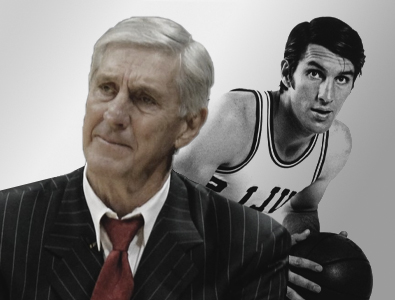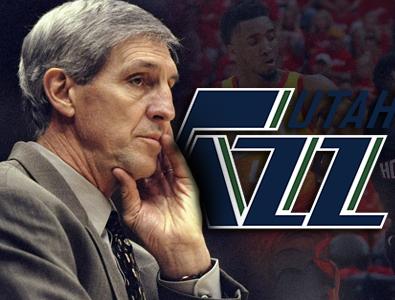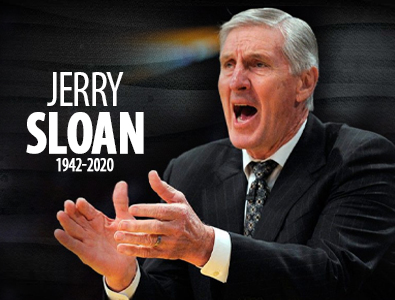On this page
Former Head Coach of Utah Jazz Jerry Sloan Died at Age 78
Introduction
On Friday, May 22nd, 2020 the former player of the Baltimore Bullets and the Chicago Bulls and the former head coach of the Chicago Bulls and the Utah Jazz, Jerry Sloan, died at the age of 78. He apparently passed away from complications from Parkinson's disease and Lewy body dementia. Sloan had disclosed these diagnoses in April of 2016.
Early Life
Sloan was born and raised in Gobbler’s Knob, Illinois which is only 15 miles south of McLeansboro, Illinois. He attended and graduated from McLeansboro High School where he was an all state player in Illinois in 1960. Jerry then attended the University of Evansville in Evansville, Indiana where he played basketball for the Purple Aces from 1962 to 1965.
Basketball Playing Career
Sloan was selected 19th overall by the Baltimore Bullets in the 1964 NBA draft, but he decided to remain in college at the University of Evansville. Sloan led the Evansville Purple Aces to their second consecutive Division II national championship. During the 1965 NBA draft the Baltimore Bullets picked him once again this time with the 4th overall selection. Jerry only played for the Baltimore Bullets during the 1965 – 1966 NBA season.
The Chicago Bulls were founded as an expansion team in the NBA in 1966. Sloan was taken by the Chicago Bulls in the 1966 NBA expansion draft, and he was known as “The Original Bull”. Sloan quickly gained a reputation from playing extremely tenacious defense, and he led the Chicago Bulls to the NBA playoffs in their first year in the league. In 1975 he also led the Chicago Bulls to their first and only division title prior to the Michael Jordan era of the 1980’s and 1990’s.
Sloan played 11 seasons in the National Basketball Association from 1965 to 1976. He retired from playing professional basketball in 1976 following a series of knee injuries. Throughout his time playing in the NBA he was selected to 2 NBA All Star teams (1967, 1969). Jerry was named to the NBA’s All Defensive First Team 4 times (1969, 1972, 1974, 1975), and the NBA’s All Defensive Second Team 2 times (1970, 1971). Sloan’s number 4 was the first number retired by the Chicago Bulls franchise which occurred on February 17th, 1978. He finished his NBA playing career with 10,571 total points, 5,615 total rebounds, and 1,925 total assists.
Basketball Coaching Career
In 1976, Sloan accepted the job of coaching his alma mater, the University of Evansville Purple Aces, but he resigned from this position after only 5 days. Fortunately for Jerry he did not stay on coaching Evansville as the basketball team and coaching staff died in a plane crash that same season. A couple years later Sloan was hired by the Chicago Bulls as a scout, and after only one year in that role he was promoted to an assistant coaching position with the Chicago Bulls.
By 1979, Sloan was promoted once again by the Chicago Bulls this time as their head coach. Unfortunately, he did not last long as the head coach of the Chicago Bulls. He was fired during his third season as the head coach of the Chicago Bulls after compiling a record of 94 wins and 121 loses. After leaving Chicago Sloan became a scout for the Utah Jazz for one season before being moved up to an assistant coach of the Utah Jazz from 1985 to 1988.
In 1988 Sloan became the head coach of the Utah Jazz where he became wildly successful as a head coach in the National Basketball Association. Jerry led the Utah Jazz to 16 consecutive winning seasons as well as 15 straight playoff appearances. Sloan coached future hall of famers in Karl Malone and John Stockton throughout his time as the head coach of the Utah Jazz. He led the Jazz to six division championships, and two Western Conference championships.
During his two appearances in the NBA Finals (1997, 1998) he lost to Michael Jordan and his former team in the Chicago Bulls, but those Utah Jazz teams gave the Chicago Bulls all they could handle during those NBA Finals appearances. Throughout his tenure with the Utah Jazz Sloan won 50 or more games during 10 different NBA seasons. At that time only the great head coaches, Phil Jackson and Pat Riley, had accomplished that amazing feat.
In April of 2009 Sloan was inducted into the Naismith Memorial Basketball Hall of Fame. On February 10th, 2011 Jerry resigned from his head coaching position with the Utah Jazz. He did return to the Utah Jazz in 2013 as an adviser and scouting consultant. In 2014 the Utah Jazz honored Sloan by raising a banner featuring the number 1,223 on it which represents the number of wins he accumulated through the regular season and the playoffs from 1988 to 2011. Sloan and Gregg Popovich are the only head coaches in NBA history to record over 1,000 wins with the same NBA franchise. Jerry Sloan will be remembered as an aggressive basketball player known for his tenacious defense as well as an outstanding coach with a no nonsense policy and state of mind.
Media Statements
"Jerry Sloan will always be synonymous with the Utah Jazz. He will forever be a part of the Utah Jazz organization and we join his family, friends and fans in mourning his loss," the Utah Jazz organization said in a recently released statement. "We are so thankful for what he accomplished here in Utah and the decades of dedication, loyalty and tenacity he brought to our franchise.
"... Like [John] Stockton and [Karl] Malone as players, Jerry Sloan epitomized the organization. He will be greatly missed. We extend our heartfelt condolences to his wife, Tammy, the entire Sloan family and all who knew and loved him."
"Jerry Sloan was among the NBA's most respected and admired legends," the commissioner of the NBA Adam Silver stated. "After an All-Star playing career in which his relentless style shaped the Chicago Bulls in their early years, he became one of the all-time greatest head coaches during 23 seasons with the Utah Jazz -- the second-longest tenure in league history. He was the first coach to win 1,000 games with the same organization, which came to embody the qualities that made Jerry a Naismith Memorial Basketball Hall of Famer: persistence, discipline, drive and selflessness.
"His more than 40 years in the NBA also paralleled a period of tremendous growth in the league, a time when we benefited greatly from his humility, kindness, dignity and class. Our thoughts are with Jerry's wife, Tammy, and their family, as well as his former players, colleagues and the Bulls and Jazz organizations."
"Jerry Sloan was 'The Original Bull' whose tenacious defense and nightly hustle on the court represented the franchise and epitomized the city of Chicago," the Chicago Bulls chairman Jerry Reinsdorf said. "Jerry was the face of the Bulls organization from its inception through the mid-1970s, and very appropriately, his uniform No. 4 was the first jersey retired by the team. A great player and a Hall-of-Fame NBA coach, most importantly, Jerry was a great person. Our sympathies go out to the Sloan family and all his many fans."
"He answered the bell all the time he was [in Chicago]," says the former Chicago Bulls general manager Rod Thorn. "He played. He played hard. You knew what you were going to get out of him. So many players, they're good for a couple games, not so good for a couple games - you're not always sure what you're going to get. With him, you pretty much knew what you were going to get every night."
"I think the Utah Jazz are Jerry Sloan," the former Utah Jazz player Mark Eaton explained. "The whole franchise is steeped in the things that he taught and put together in the '90s, and I think that everything is measured against that. You look at the team today, and I notice that when players make great plays of effort where they're getting after a loose ball on the floor or blocking out or getting a steal or making something happen, the crowd reacts.
"It's what this market is known for and what the team is known for, and I think he was well-revered around the league because of that, because he had one philosophy and he stuck to it and it produced results and everybody got on board from ownership down to the players, and I think that's the legacy."
Darrell Griffith proclaimed, "He's one of the top coaches in the NBA even though he didn't win a championship. That didn't minimize his accomplishments. He's been great for Utah, for the team and the basketball world. He's taken that franchise and made it what it is over 23 years. He's a Hall of Fame coach, and there's nothing more you can add to what he's done. He's going to go down as one of the top coaches in the game. He already is, and rightfully so."
"I've had confrontations with players since I've been in the league," Jerry Sloan said previously. "There's only so much energy left, and my energy has dropped."
"I'm not into numbers and stuff like that," says Sloan in 2010. "I never have been. I've got a great organization to work for that's given me an opportunity to stay there for a long time. I'm very thankful for that and the coaches that I have with me. It's not about me."
"It was an honor and a privilege to have one of the greatest and most respected coaches in NBA history coaching our team," says the Miller family, which owns the Jazz. "We have appreciated our relationship with Jerry and acknowledge his dedication to and passion for the Utah Jazz.
"He has left an enduring legacy with this franchise and our family. The far-reaching impact of his life has touched our city, state and the world as well as countless players, staff and fans."
"Oh, he was a dear friend,'' says former NBA head coach Don Nelson. "Even if he did fight me the first time we ever met.''
"He set me up,'' Nellie remembers. "He knew I had no choice but to run over him. And then, even though he got the call, he got up and tried to hit me.''
"Back then, they didn't throw you out of the game,'' says Nellie, "so we kept on playing. And Jerry was fine. That's how he was. He was a real tough guy, but he'd have his say and move on.''
"I'd put Jerry as one of the top three or four all time I've ever faced,'' the former NBA head coach George Karl expressed. "His teams were really difficult to play against. They were very tough-minded, very team-oriented.
"Jerry would not tolerate a lot of the NBA bulls--- that goes on. He was demanding, but respectful. Every Utah Jazz player I ever spoke to had nothing but great things to say about him.''
"Jerry was a farmer at heart,'' says Phil Jackson. "We all enjoyed his fire and his sportsmanship ... both ends of the coaching spectrum."
Sloan Miles stated, "I don't care if he's 19 or 30. If he's going to be on the floor in the NBA, he's got to be able to step up and get after it. We can't put diapers on him one night, and a jockstrap the next night. It's just the way it is.''
The former Utah Jazz president and coach Frank Layden says, "Nobody fights with Jerry because you know the price would be too high. You might come out the winner, at his age. You might even lick him. But you'd lose an eye, an arm, your testicles, in the process.''
"But here's the wonderful thing about Jerry,'' says the former NBA official Joey Crawford. "He'd get mad, but you could go back at him and say a lot of stuff to him, and he would never ever rat you out. You could even curse him out, but he was never going to call the league office the next morning to complain, like some other coaches would.
"I had a helluva lot of respect for the man. We all did.''
"I liked his competitive spirit,'' Lenny Wilkens said. "His teams were always so prepared, and he wasn't going to let you do what you wanted to do. We both believed defense could influence a game.
"And, like me, he wasn't about to let you walk to the basket. That's not how we were raised.''
"He had a great influence on our team,'' Wilkens recalled. "He's one of those people who had instant credibility on the court.''
"I was very disappointed for him,'' says Wilkins, "and I let the people on the Olympic committee know about it. It wasn't right. We did a great job [in '96] and Jerry was a big part of it.''
"Our first couple of years when I was in Seattle, we doubled Malone and we doubled Stockton, and they figured out how to destroy us,'' Karl stated. "He kept it simple, but what he drew up was rock-solid, and his players followed his lead.
"I loved the battles with Jerry. They were physical, but [the Jazz] played as a team and understood that you had to stick together in competition.
"Jerry demanded that. He demanded that his players be good teammates, genuine and true.''
"And that is rare,'' says Greg Popovich. "He was a mentor for me from afar until I got to know him. A man who suffered no fools, he possessed a humor, often disguised, and had a heart as big as the prairie."
"I think Jerry may have been the most competitive guy I ever coached against,'' says Nelson. "But when the game was over, it was over. I remember talking to him when he was getting ready to retire. He was looking forward to going back to his farm. He loved driving the fields on his tractor.''
"He wasn't the kind of guy to sit and cry about what he did and didn't do,'' says Wilkens. "He loved the game. That was enough.
"And there's no question the game loved him back.''
"Jerry Sloan was among the NBA's most respected and admired legends," the NBA commissioner Adam Silver stated. "He was the first coach to win 1,000 games with the same organization, which came to embody the qualities that made Jerry a Naismith Memorial Basketball Hall of Famer: persistence, discipline, drive and selflessness."
"The clear identity that he established for Jazz Basketball -- unselfishness, toughness and the essential importance of Team -- has always left a palpable responsibility to strive for in carrying forward," the current Utah Jazz head coach Quin Snyder tweets. "He will be missed and mourned by the Jazz family, the NBA and beyond."
Pat Riley posted: “It was a privilege to play against a Jerry Sloan coached team, I always knew that we would be severely tested. His overall philosophy on both sides of the ball was fundamentally solid and always one step ahead of the game."
"I think that for all of his intensity on the court and his demand for doing it the right way, the fact that he'd come to shootaround with his John Deere hat on and just be so down to earth in terms of who he was off the court, I think it's the most endearing quality about him that really resonated with players," the former Utah Jazz All Star center Mark Eaton explained. "In the crazy world of the NBA and all the crazy stories you hear every day and here's this guy who's from [Illinois] the heartland of America who just came to work, put his work boots on and just said, 'Let's get to it.' It was just something that is a rare find in the world today and I think that's what made him so unique and what everybody loved about him."
"I remember him sitting there and watching pretty much every practice years after he was retired. I also know that he really respected hard work, more than anything, and I could sense that he really respected and loved players that have that mindset since the first day I spoke with him," says Rudy Gobert.
"He brought a lot to the game. He knew a lot about the game, he was a student of the game, he learned a lot from [former Jazz coach Frank Layden] and as a player, he brought that to the players on the floor," says Darrell Griffith. "He brought a lot to the game and I learned a lot from him as a coach and as a human being, so it was sad news for me to hear today."
Gordon Hayward posted: “I didn't get to spend a lot of time playing for Coach Sloan, but coming in as a rookie he had a major impact on my transition to the @NBA. I'm grateful for that. Prayers to his family, friends and loved ones. May he Rest In Peace.”
Sources:
“Longtime Jazz coach Jerry Sloan dies at age 78”, espn.com, May 22, 2020.
“Jerry Sloan remembered by fellow coaches Don Nelson, Phil Jackson, Lenny Wilkens”, Jackie MacMullan, espn.com, May 22. 2020.
“NBA stars and Utah Jazz legends react to death of Jerry Sloan”, espn.com, May 22. 2020.
“Jerry Sloan”, basketball-reference.com, May 22, 2020.





